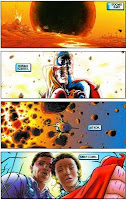On his awesome
blog two days ago, Tom Brevoort made note of something he read on the Internet:
Read a piece over the weekend in which, in speaking about a particular project that had recently been completed to some acclaim, an editorial personality complimented the sales, marketing and production teams, as well as himself and his fellow editors, on the success of the series. One group, however, was missing from his litany of back-patting:
The creators.
He makes a good point, and doesn't dwell on the disagreement or on the source of the information. He's airing a professional difference of opinion, and trying to make a point without being overly snide. But, come on. I also read Dan DiDio's 20 Answers and 1 Question over at Newsarama, where just
three days previously, DiDio made the following statement:
The concept that I am not proud of 52 is ridiculous. Anybody here who knows me knows that the minute issue #52 of 52 hit my hands was one of my proudest moments at DC Comics. It's something that I was involved in from the very inception of the project, and made sure that everything worked perfectly in order to achieve that. It was a project and process that we all worked for. It was the editors, the sales department, the marketing department, the production department. Every single person who worked on 52 is intensely proud of their work on that production. When we started it, we were not sure if we were going to be able to achieve our goals, and we exceeded them. So again, any statement being said about me not being proud of 52 is erroneous.
We know who you're writing about Brevoort! You can't fool us by casually obscuring the object of your wrath!
The biggest challenge was actually, wisely, kept from us by Steve. EIC Dan Didio, who first championed the concept, hated what we were doing. H-A-T-E-D 52. Would storm up and down the halls telling everyone how much he hated it. And Steve, God bless him, kept us out of the loop on that particular drama. Siglain, having less seniority, was less able to do so, and there's one issue of 52 near the end that was written almost totally by Dan and Keith Giffen because none of the writers could plot it to Dan's satisfaction. Which was and is his prerogative as EIC, but man, there's little more demoralizing than taking the ball down to the one-yard line and then being benched by the guy who kept referring to COUNTDOWN as "52 done right."

Everyone here is, of course, espousing his own particular point of view and no one is calling anyone else a liar or an idiot. Well, Waid gets pretty close. But what's most interesting is to note the different emphasis each professional editor makes. Brevoort takes the piss out of DiDio a bit, but makes a pretty convincing argument that the editor isn't much of anything without creators. Point well made, and point well taken. Waid, similarly, remarks how Steve [Wacker] kept the already-difficult creative process of 52 from being even more of a hassle by shielding the "brain-trust" from the wrath of the Executive Editor.
DiDio, on the other hand, is trying to play spin doctor. We see DiDio and Joe Quesada do this every week, and it's pretty great of them to make the time. Well, Quesada just quit his weekly column on MySpace, but he has been doing it on and off for years now and will probably be back sooner or later. I'm not trying to attack DiDio here, or at least not trying to, but Brevoort makes a pretty good point. DiDio is so concerned with ass-covering that he misses the point that I infer Waid was making: as a company, DC is a bit heavy-handed.
Yes, Marvel has plastered a Dark Reign banner on everything and everyone there seems constantly a-twitter about the editorial retreats that they go on all the time. But the one impression I was left with after reading DiDio's interview was this particular statement of his:
So when you say "editorial mandate," please understand that whatever book you hold in your hand, at the end of the day, is there because of an editorial mandate to create that book. End of story.
Again, I get his point. Editors do more than shuttle paper around the office. But, it's NOT the end of the story. The editor, in fact, is NOT TELLING THE STORY. I think that I'm more persuaded by Brevoort's point that, yes, editors do more than shuttle paper around but the most important part is to be finding the balance between dramaturge, babysitter, advocate, and taskmaster. You can tell this because of my impartial use of capital letters for emphasis. Maybe this is because DiDio fancies himself a bit of a writer (remember how, earlier, I said I didn't want to attack him? Well, here I do: his piece in the DC Holiday Special was the worst thing I

have read in a long time, and I collected X-Force when Jeph Loeb tried to explain Shatterstar's origin). Or maybe it's because he feels constantly maligned. Regardless, I think my biggest problem with DC these days can be encapsulated in DiDio's interview. I don't care if everything DC has published in the last 7 years has all been one glorious mosaic, all planned from the very beginning and all directed toward geeky bliss. I don't care if everything fits together, if it's all one grand universe in which reading each comic they publish will enrich the experience of every other.
I just want DC to publish better comics. If Countdown and Trinity, or even the DiDio-edited Teen Titans, are comics where the editors are more important than the creators, maybe I'd rather DiDio did just organize his pencil drawer.






 motivations don't often make much sense). But I still watch it. I find Tom Welling's performance fun, even though his line readings sometimes sound like he's phonetically repeating words in a language that he doesn't understand. Allison Mack is quite affecting, especially when she doesn't have to heroically power through embarrassing Whedon-esque verbal tics. I also really liked how, this past season, they made the Clark/Lex homoeroticism blatant by making Lex a woman and having her flirt with Clark mercilessly (yeah, I know, she wasn't
motivations don't often make much sense). But I still watch it. I find Tom Welling's performance fun, even though his line readings sometimes sound like he's phonetically repeating words in a language that he doesn't understand. Allison Mack is quite affecting, especially when she doesn't have to heroically power through embarrassing Whedon-esque verbal tics. I also really liked how, this past season, they made the Clark/Lex homoeroticism blatant by making Lex a woman and having her flirt with Clark mercilessly (yeah, I know, she wasn't 

 three (and a half) questionable movies in a row and the diminishing returns of increasingly less popular television series.
three (and a half) questionable movies in a row and the diminishing returns of increasingly less popular television series.  piper is an imminent cosmic cross-over about super-powered zombies. Since the self-identified "lighter" books, like the Jaime Reyes
piper is an imminent cosmic cross-over about super-powered zombies. Since the self-identified "lighter" books, like the Jaime Reyes 
